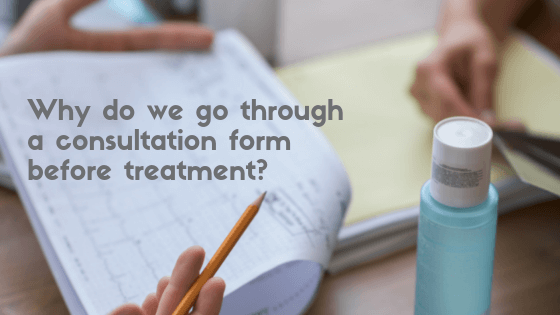Before your first massage, we have a thorough consultation.
I’ve got a consultation form that will ask about what medications and medical conditions you have, and a whole host of questions about your health history and life.
So why is this? Am I being nosy? Why do I need to know such detailed, personal information about you that you may only otherwise share with your GP?
While it may seem like a hassle or invasion of your privacy to answer all the e questions when you just want me to give you a massage, there’s an excellent reason I want to know so much about your health: Knowing your health history not only protects you from potential injury during your massage, but it also means I can better personalise your massage to your needs. This ensures that when you leave the massage table, you feel better than ever.
What is a contraindication, and what does it have to do with my massage?
Every so often, it turns out that for some people in specific health situations, massage could actually be harmful. This is referred to as a contraindication, and there are two different classifications of contraindications:
Local Contraindication: This means that caution should be used when performing a certain procedure. In the world of massage therapy, this means that a massage therapy session can happen, but that the therapist will need to adjust the techniques and particulars of the session (like positioning, pressure, even massage products used) to stay safe and effective.
Absolute Contraindication: This is the term used when massage could cause harm, and should not be applied at all. This is pretty rare, but it happens.
While typically relaxing and healing, there are times when a massage can be painful or even dangerous, for various health-related reasons. In most cases, this means we can proceed with the massage, but I’ll ask some follow up questions to keep it safe and effective.
Examples of massage contraindications include:
● Varicose veins
● Undiagnosed lumps or bumps
● Pregnancy
● Bruising, cuts, abrasions, and even sunburn (we do occasionally see the sun in Yorkshire!)
● Skin conditions like Psoriasis and Eczema
● High blood pressure
● Cancer
● Osteoporosis
● Heart problems
● Epilepsy
Don’t worry, not all of the above listed medical conditions mean you have to give up your regular session with your massage therapist.
In fact, for some of these conditions, massage can have major soothing effects. However, it does mean that your therapist will need to give you specific care. This is one of the main reasons it’s vital I know your medical history.
Also, colds, the flu, skin infections, or the presence of a fever are all reasons to wait to get a massage until you are feeling better. Seriously having a massage with a cold or flu is not pleasant. Just think of the congestion you’ll get lying face down, it’s really grim!
Why does my massage therapist need to know what medications I am taking?
There are some medications that have an effect on your body’s ability to heal and process correctly and I need to be aware of what you’re taking so I can make adjustments.
For example, a firm deep tissue massage could be very dangerous if you are taking blood thinners, or if you’ve been on corticosteroids for a long time, you may have low bone density or thin skin as a result.
In almost all cases, we can make adjustments to keep your massage safe and effective, the key is to keep
me fully informed.
To sum up, even if you think a detail may be irrelevant, it’s a good idea to answer fully and honestly. That helps me create the best and safest massage, just for you.


Recent Comments